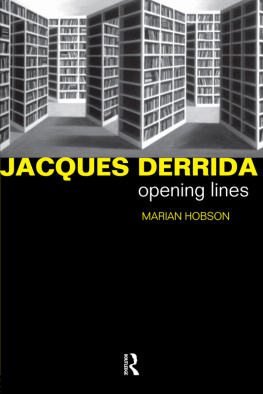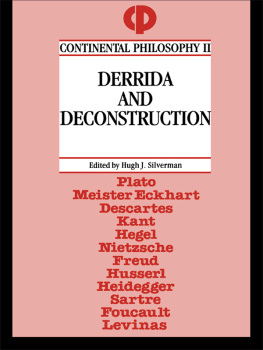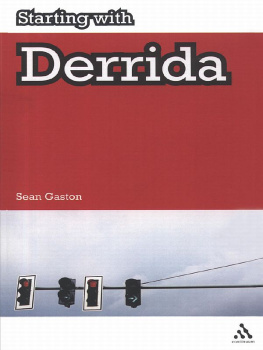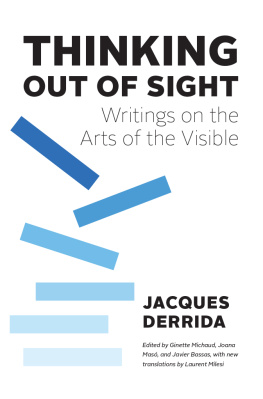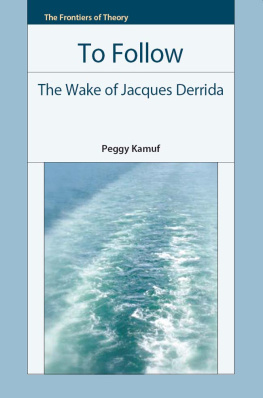Derrida Jacques - Jacques Derrida opening lines
Here you can read online Derrida Jacques - Jacques Derrida opening lines full text of the book (entire story) in english for free. Download pdf and epub, get meaning, cover and reviews about this ebook. City: London;New York, year: 1998, publisher: Taylor & Francis (CAM);Routledge, genre: Religion. Description of the work, (preface) as well as reviews are available. Best literature library LitArk.com created for fans of good reading and offers a wide selection of genres:
Romance novel
Science fiction
Adventure
Detective
Science
History
Home and family
Prose
Art
Politics
Computer
Non-fiction
Religion
Business
Children
Humor
Choose a favorite category and find really read worthwhile books. Enjoy immersion in the world of imagination, feel the emotions of the characters or learn something new for yourself, make an fascinating discovery.
- Book:Jacques Derrida opening lines
- Author:
- Publisher:Taylor & Francis (CAM);Routledge
- Genre:
- Year:1998
- City:London;New York
- Rating:3 / 5
- Favourites:Add to favourites
- Your mark:
- 60
- 1
- 2
- 3
- 4
- 5
Jacques Derrida opening lines: summary, description and annotation
We offer to read an annotation, description, summary or preface (depends on what the author of the book "Jacques Derrida opening lines" wrote himself). If you haven't found the necessary information about the book — write in the comments, we will try to find it.
Jacques Derrida opening lines — read online for free the complete book (whole text) full work
Below is the text of the book, divided by pages. System saving the place of the last page read, allows you to conveniently read the book "Jacques Derrida opening lines" online for free, without having to search again every time where you left off. Put a bookmark, and you can go to the page where you finished reading at any time.
Font size:
Interval:
Bookmark:
Jacques Derrida
Of the very many books on Derrida that have already appeared, Marian Hobsons must surely count as one of the most challenging and the most stimulating. Her own text interacts with those which she discusses in ways that are truly illuminating of both not least in the very fact and nature of their interaction. Hobson displays a remarkable sense for the main deeply underlying themes of the philosophical-cum-literary tradition within and through which Derrida is working, themes which continue to work themselves out in his and indeed her writing.
Alan Montefiore, Emeritus Fellow of Balliol College, Oxford
In this exceptionally sophisticated book, Marian Hobson has done what no other book to date on Derrida has done: to explore the relation of argument to the mode of writing. By exhibiting the patterns of organizations, filaments of construction, micromovements, circuits of argumentation, which constitute the undercurrent of his writings from which, like the tips of icebergs, Derridas coinages of individual terms, positions, and determined arguments, including deconstruction, emerge to be thematized, Hobson succeeds in demonstrating the rigor of Derridas work, more precisely, the unheard kind of consistency that characterizes it. Above all, this superb study on the question of language in Derrida, and Derridas language, by emphasizing his writerly strategy of sketching links, reinforcing connections between words, themes, arguments, and providing for extensions into other texts, shows Derridas work to stage incalculable possibilities of connection from whence future commentaries are allowed to proceed.
Rodolphe Gasch, Eugenio Donato Professor of Comparative Literature,
State University of New York at Buffalo
Marian Hobson is Professor of French at the University of London, Queen Mary and Westfield College. She is the author of The Object of Art (1982) and co-editor of Reappraisals of Rousseau (1980) and Rousseau et le dix-huitime sicle (1993).
Critics of the Twentieth Century
General Editor: Christopher Norris
University of Wales, Cardiff
Northrop Frye
The theoretical imagination
Jonathan Hart
A. J. Grimas and the Nature of Meaning
Ronald Schleifer
Christopher Caudwell
Robert Sullivan
Figuring Lacan
Criticism and the cultural unconscious
Juliet Fower MacCannell
Harold Bloom
Towards historical rhetorics
Peter de Bolla
Julia Kristeva
John Lechte
Geoffrey Hartmen
Criticism as answerable style
G. Douglas Atkins
Introducing Lyotard
Art and politics
Bill Readings
Ezra Pound as Literary Critic
K. K. Ruthven
F. R. Leavis
Michael Bell
Deleuze and Guattari
Ronald Bogue
Postmodern Brecht
A re-presentation
Elizabeth Wrght
The Ecstasies of Roland Barthes
Mary Bittener Wiseman
Paul Ricouer
S. H. Clark
Jrgen Habermas
Critic in the public sphere
Robert C Holub
William Empson
Prophet against sacrifice
Paul H. Fry
Antonio Gramsci
Beyond Marxism and postmodernism
Renate Holub
Kenneth Burke
Rhetoric and ideology
Stephen Bygrave
Roman Jakobson
Life, language, art
Richard Bradford
First published 1998
by Routledge
2 Park Square, Milton Park, Abingdon, Oxon, OX14 4RN
Simultaneously published in the USA and Canada
by Routledge
711 Third Avenue, New York, NY 10017
Transferred to Digital Printing 2011
1998 Marian Hobson
All rights reserved. No part of this book may be reprinted or reproduced or utilized in any form or by any electronic, mechanical, or other means, now known or hereafter invented, including photocopying and recording, or in any information storage or retrieval system, without permission in writing from the publishers.
British Library Cataloguing in Publication Data
A catalogue record for this book is available from the British Library
Library of Congress Cataloging in Publication Data
Hobson, Marian.
Jacques Derrida: opening lines / Marian Hobson.
p. cm. (Critics of the twentieth century)
Includes bibliographical references and index.
1. Derrida, Jacques Language. I. Title. II. Series: Critics of the twentieth century (London, England)
B2430.D484H63 1998 | 98-13838 |
| 194-dc21 | CIP |
ISBN 0-415-02197-9 (hbk)
ISBN 0-415-13786-1 (pbk)
Publishers Note
The publisher has gone to great lengths to ensure the quality of this reprint but points out that some imperfections in the original may be apparent.
For AB, JB, MGC, KE, JK, MJ, MNJ, RP, SP, AS, MW.
Contents
Acknowledgements
A debtor may not always be conscious of debts contracted. I have tried to record what I owe in footnotes and references, but I am aware of being a great deal more endebted than can easily be flagged, both to the writings and to the conversation of Geoff Bennington, Rodolphe Gasch, Chris Johnson and Sam Weber. Without Peggy Kamufs generosity in reading several draft chapters and in responding to queries, this book might still be on the word processor. Terence Cave, Alan Montefiore and Margaret Whitford, each with a variety of dour kindness, helped me clarify the argument at certain important points; I owe a great deal to their patience. I owe thanks to Chris Norris, the editor of the series, for commissioning what was in the first stages of its composition a very different book, and for helping the finished manuscript through its last stages. At various points, I have been very grateful for comments or advice on problems I encountered from Tom Baldwin, Nick Denyer and Simon Glendinning. Sidney Allen has over a long period supplied me with philological detail which would have taken a long time to constitute unaided. I am grateful to Marianne Ronfl-Nadaud for her help in locating and in translating some of the quotations, and in constructing the bibliography. Finally, the book would not exist in a final form without Rodney Laing, Nick Higgins, and the NCCU at Addenbrookes Hospital, Cambridge; nor without a group of friends, whose unsentimental visits, whose chatter over, across, round and at me when comatose, kept the unconscious on the move and body and soul together. The book is dedicated to them.
As a writer Derrida is both productive and difficult. This creates material and psychological difficulties in writing about his work. The library of Trinity College, Cambridge has made some matters of bibliography a great deal easier than they might otherwise have been, and I owe thanks. I am enormously grateful to the French Department of the Johns Hopkins University for the visiting professorship which allowed me the time I needed to finish the book. Writing in a case like this, where attempting to get things right is more than a matter of rectitude (in itself quite important enough) because the object of study can read and react, is a strange enterprise. The work studied is in the public domain, but has a live connection back to the private concerns of its author. I am grateful to my books subject for an approval of the project which remained general and forebearing of further enquiry.
Abbreviations
The edition referred to appears under the date and title in the bibliography; italicized abbreviations refer to the translation (see under the original edition for details of the translation)
Next pageFont size:
Interval:
Bookmark:
Similar books «Jacques Derrida opening lines»
Look at similar books to Jacques Derrida opening lines. We have selected literature similar in name and meaning in the hope of providing readers with more options to find new, interesting, not yet read works.
Discussion, reviews of the book Jacques Derrida opening lines and just readers' own opinions. Leave your comments, write what you think about the work, its meaning or the main characters. Specify what exactly you liked and what you didn't like, and why you think so.

